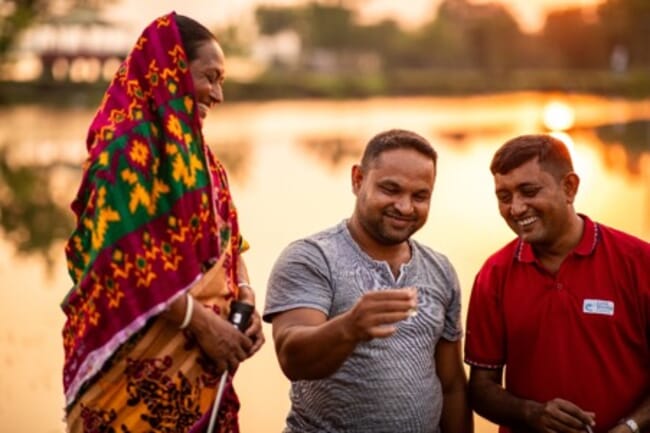
© ASC Improver Programme
Roy van Daatselaar, head of ASC’s Improver Programme, attended the event in July alongside LENK Frozen Foods, highlighting the benefits of the programme for farms not yet ready for ASC certification. The Improver Programme is designed to assist these farms in improving their practices with the goal of eventually meeting ASC’s certification standards.
September 2023 marked a milestone for the ASC in Bangladesh, with the launch of the country's first Aquaculture Improvement Project (AIP) under the Improver Programme. This initiative, in collaboration with LENK Frozen Foods and Luna Shrimp Farms, involves 125 farmers across five clusters who are currently producing up to 400 kilogrammes of shrimp per hectare annually. LENK Frozen Foods is also initiating a second AIP, which will expand the programme to include an additional 275 farmers.
During the expo, attendees were shown a short film created by ASC, capturing the experiences of local farmers in the Satkhira region who are participating in the AIP. The film portrays the positive changes these farmers have made, thanks to training in better farming practices, and the subsequent benefits for the local environment, economy, and society.
Van Daatselaar and Heiko Lenk, managing director of LENK Frozen Foods, took the opportunity to visit the farmer clusters involved in the AIP during their time in Bangladesh. Their visit included discussions on the progress of the project, challenges faced by the farmers, and the social benefits of the Improver Programme, including community building and social engagement.
Elevating Bangladeshi black tiger shrimp
Bangladesh’s fisheries and seafood farming sectors are important for the country’s economy, and ASC’s work aligns with national priorities to harness aquaculture’s potential. While neighbouring Asian countries focus on Pacific white shrimp, Bangladesh is known for its traditional, extensive cultivation of black tiger shrimp, or "bagda."
Roy van Daatselaar emphasised that the AIP is not only about improving farming practices and moving towards ASC certification. “We are aiming to unlock premium markets for Luna Shrimp Farms products by improving practices along the supply chain to maintain product quality,” he said. “This could create a better value proposition and open up opportunities for shared value creation, including better prices for farmers.”
Heiko Lenk echoed this sentiment, adding, “We see strong potential to build a premium brand around the culture and heritage of natural black tiger shrimp production.”
Community support through aquaculture
The benefits of the AIP extend beyond the shrimp farmers themselves, reaching into the broader community. Many of these communities are located in remote areas with limited access to essential services such as education, transportation, and water supply.
“Community building and social engagement are integral to our work with the AIP,” said Heiko Lenk. “For example, we recently renovated a local school, provided teaching materials, and improved water facilities. We’re also looking at long-term initiatives such as mangrove reforestation to support the environment and the livelihoods of local people.”
LENK aims to continue its community-building efforts, with plans to establish the Luna Shrimp Farms Foundation in the future. Lenk also highlighted the potential for this work to inspire other farmers and industries to value Bangladeshi black tiger shrimp more highly and expand into markets beyond Europe.
Looking ahead, van Daatselaar expressed hope for the AIP’s growth. “If we can increase the number of farmers in the AIP from 125 to around 300 or 400, it will start generating significant business income. This, in turn, will allow Lenk to reinvest in the community through a charitable foundation.”
About BIASS
The BIASS event, organised by Solidaridad, aims to position Bangladesh as a key player in the international seafood market, with an ambitious goal of achieving $5 billion in annual seafood exports by 2030. The expo featured 54 stalls, including seven foreign enterprises, and attracted over 50 international delegates from 12 countries.
Moid Uddi Ahmed, strategic engagement lead for Aquaculture at Solidaridad, noted the valuable contribution of ASC’s participation, stating that ASC’s insights will help shape the BIASS roadmap, which seeks to promote the sustainable development of Bangladesh's seafood sector on the global stage.




